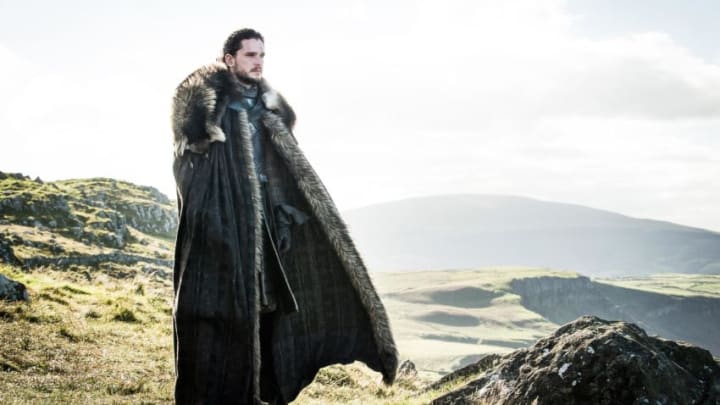
The issue of Jon’s consent
Jon arrives on Dragonstone with the express purpose of making a military alliance with Daenerys Targaryen, unaware of the stipulation that Daenerys expects him to bend the knee. When Jon learns of this stipulation, he’s ready to return to the North, insisting that there’s “no time” for any war aside from the one against the White Walkers. There is nothing for him on Dragonstone without Daenerys’ cooperation; he might as well return to the North empty-handed but overall no more or less prepared than he was prior to the journey.
But Daenerys has other ideas for the King in the North, the king who refuses to abdicate his rule.
"JON: “Am I your prisoner?” DAENERYS: “Not yet.”"
Only he very much is. When Jon and his party arrive on Dragonstone, Daenerys’ followers confiscate their weapons. Daenerys keeps all of hers, including her dragons, and makes clear that she expects Jon to bend the knee to her, one way or another. He may not be confined to a cell, but Jon is being held against his will, with no means of fight or flight; that’s imprisonment. And Jon recognizes himself as a prisoner; his consent in the matter is nonexistent.
From the beginning, the power dynamic between Jon and Daenerys is lop-sided. Jon is either her prisoner or her subservient, and as such, he’s at her mercy. That can be a precarious position to be in, as we saw when Daenerys executed the Tarlys. Jon observes this much about Daenerys’ character when she rages at Tyrion on the beach in “The Spoils of War,” before she leaves for the Blackwater Rush.
So what’s Jon’s objective? To survive and escape by any means necessary, which proves difficult. Even after Jon leaves Dragonstone for Eastwatch, he later finds himself back where he started: under Daenerys’ thumb, on a Targaryen ship headed wherever she commands it to go. Once again, he has to spin his less-than-favorable circumstances to his advantage during their scene in the ship’s cabin.
Jon’s lack of free will is underlined by the original script for that scene. In an earlier draft, Daenerys undresses an unconscious Jon as he lays in bed and sees the scars left by his murder for the first time. In the final cut of that scene it is Davos, a man Jon knows and trusts, who undresses him, while Dany sees the scars as a passive viewer. Even though the final version of the scene made a different choice, the original version is telling, since it gives a look into how the producers originally conceived of the power dynamic between Jon and Daenerys, and could hint at how the audience is meant to perceive their relationship. Dany disrobing Jon is not romantic because Jon, being unconscious, has not consented to it, nor has he consented to the moments leading up to it.
True: in “Beyond the Wall,” Jon bids Gendry to send word to Daenerys before he and his companions get trapped on a frozen lake surrounded by wights, but that was about the fact that Daenerys had the means to rescue them, not Jon’s desire to become her prisoner all over again. Even when Dany arrives with the dragons in tow, Jon is prepared to stay behind in an (ill-fated) attempt to end the White Walker threat on his own — he is slow to mount Drogon when everyone else has already climbed aboard, and seems to be seriously considering making a run at the Night King and ending things once and for all.

Another scrapped bit of dialogue comes from an early outline of the script for “The Dragon and the Wolf,” the season 7 finale. (Like a lot of things in season 7, it leaked ahead of time.) In this draft, at the end of the meeting where Jon and Dany decide to sail to White Harbor together, Dany mentions that “[s]he has some things she’d like to discuss with Jon later, privately,” essentially summoning him to her chambers. This leads to the sex scene at the end of the episode. And who is Jon — who has pledged fealty to her as a queen, thereby making him her subject — to deny her such a request?
The outline also contains this direction: “Jon walks into Dany’s cabin below decks, knowing exactly what he wants and what she wants.”
This word choice suggests that what Jon wants and what Daenerys wants are two separate things. Were they on the same page, the outline probably would have been worded more deliberately, e.g. “Jon walks into Dany’s cabin below decks, knowing exactly what they both want,” or even, “[…] knowing exactly what he wants.” Instead, the phrasing suggests that Jon and Daenerys have two different goals, and that Jon is willing to exchange “what she wants” for “what he wants.”
